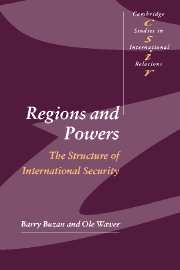Book contents
- Frontmatter
- Contents
- List of illustrations
- Preface
- List of abbreviations
- 1 Patterns of regional security during the Cold War
- 2 Patterns of regional security post-Cold War
- Part I Introduction: developing a regional approach to global security
- Part II Asia
- Part III The Middle East and Africa
- Part IV The Americas
- Introduction
- 9 North America: the sole superpower and its surroundings
- 10 South America: an under-conflictual anomaly?
- Conclusions: scenario for the RSCs of the Americas
- Part V The Europes
- Part VI Conclusions
- Glossary
- References
- News media
- Index of names
- General Index
- CAMBRIDGE STUDIES IN INTERNATIONAL RELATIONS
Introduction
Published online by Cambridge University Press: 05 December 2009
- Frontmatter
- Contents
- List of illustrations
- Preface
- List of abbreviations
- 1 Patterns of regional security during the Cold War
- 2 Patterns of regional security post-Cold War
- Part I Introduction: developing a regional approach to global security
- Part II Asia
- Part III The Middle East and Africa
- Part IV The Americas
- Introduction
- 9 North America: the sole superpower and its surroundings
- 10 South America: an under-conflictual anomaly?
- Conclusions: scenario for the RSCs of the Americas
- Part V The Europes
- Part VI Conclusions
- Glossary
- References
- News media
- Index of names
- General Index
- CAMBRIDGE STUDIES IN INTERNATIONAL RELATIONS
Summary
In contrast to what happened later in Africa and Asia, the Americas were not just occupied, but largely repeopled, by Europe. With the exceptions of Canada and a few Caribbean colonies, the European settler-states in the Americas broke free from Britain, Spain, and Portugal during the late eighteenth and early nineteenth centuries. As happened later in Africa and Asia, this first wave of decolonisation was achieved by taking on the form of the European state and, as this was done, the conditions for standard RSCs came into being.
Despite recurrent hemispheric projects, the Americas are not one RSC. North and South America have different security dynamics and connections are highly asymmetrical. US engagement in Latin America is a classical case of a complex containing a great power impinging on a neighbouring one without great powers. South America has only infrequently been the primary security concern of the United States, and in South America the driving security dynamics are mostly regional, not US-orientated. So even recurring US involvement does not justify seeing the Americas as one RSC. The USA is an (important) external actor in South America, and South America has some spillover security effects in North America, but most issues that upset Canada will be of minor relevance to Brazil and vice versa.
It is clear that North America is one RSC, and equally clear how to delineate it towards north, east, and west, but it is less clear where it ends to the south.
Information
- Type
- Chapter
- Information
- Regions and PowersThe Structure of International Security, pp. 263 - 267Publisher: Cambridge University PressPrint publication year: 2003
